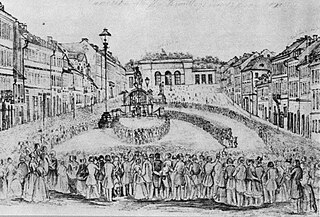Slavic or Slavonicstudies, also known as Slavistics, is the academic field of area studies concerned with Slavic peoples, languages, literature, history, and culture. Originally, a Slavist or Slavicist was primarily a linguist or philologist researching Slavistics. Increasingly, historians, social scientists, and other humanists who study Slavic cultures and societies have been included in this rubric.
Bogdan or Bohdan is a Slavic masculine name that appears in all Slavic countries as well as Romania and Moldova. It is derived from the Slavic words Bog/Boh, meaning "god", and dan, meaning "given". The name appears to be an early calque from Greek Theodore or Hebrew Matthew with the same meaning. The name is also used as a surname in Hungary. Bogdana is the feminine version of the name.

Vladislav is a male given name of Slavic origin. Variations include Volodislav, Vlastislav and Vlaslav. In the Czech Republic, Slovakia and Croatia, the common variation is Ladislav.
Zajac is a common Slavic name, meaning “hare”. Variants include Zajtich, Zaek, Zając, Zajec, Zajić, Zajíc, Zayak, Zayats, Zayets, Zients, Ziontz, Zionce, and Zajonc. A related Russian surname is Zaytsev. Notable people with the surname include:

Vladimir is a masculine given name of Slavic origin, widespread throughout all Slavic nations in different forms and spellings. The earliest record of a person with the name is knyaz Vladimir of Bulgaria.
Lazar is a male given name or a surname. An abbreviation of the Hebrew name אֶלְעָזָר Eleazar or אֱלִיעֶזֶר Eliezer meaning 'God has helped' which first appeared in Jewish Aramaic and is especially common in various Slavic languages.
Stanislav and variants may refer to:

The Prague Slavic Congress of 1848 took place in Prague between 2 June and 12 June 1848. It was the first occasion on which voices from nearly all Slav populations of Europe were heard in one place.
Ivan is a Slavic male given name, connected with the variant of the Greek name Iōánnēs from Hebrew יוֹחָנָן Yôḥānnān meaning 'God is gracious'. It is associated worldwide with Slavic countries. The earliest person known to bear the name was the Bulgarian Saint Ivan of Rila.

Given names originating from the Slavic languages are most common in Slavic countries.
Vera is a female given name of Slavic origin, and by folk etymology it has also been explained as Latin vera meaning "true". In Slavic languages, Vera means faith. The name Vera has been used in the English speaking world since the 19th century and was popular in the early 20th century. In Turkish Vera means piety.
Petrov or Petroff or Petrova, is one of the most common surnames in Russia and Bulgaria. The surname is derived from the first name Pyotr or Petar and literally means Pyotr's or Petar's.
Ludmila or Ludmilla is a female given name of Slavic origin. It consists of two elements: lud ("people") and mila. Because the initial L is mostly soft (palatalized), it is sometimes also transcribed Lyudmila, Lyudmyla or Ljudmila, and is written as Ľudmila or Ľudmyla in Slovak.
Rastislav or Rostyslav is a male Slavic given name, meaning "to increase glory". The name has been used by several notable people from Bulgarian, Czech, Polish, Russian, Serbian, Slovak, and Ukrainian backgrounds.
Stanko or Stańko is a variation of the Slavic masculine given name Stanislav. Nicknames in Serbo-Croatian: Ćane, Ćano. Notable people with the name include:
Ljuba is a Slavic given name. In the Serbian language, it is best known as a masculine name, cognate to Ljubomir or Ljubo. In other Slavic languages it's more often a feminine name, cognate to Lyubov, and also spelled Lyuba, Luba, Ľuba (Slovak).
Stas is a reduced form, among many, of the Slavic language given name Stanislav known under several spellings. It may also serve as a given name of its own. Notable people commonly referred to with the name Stas or variants include:




